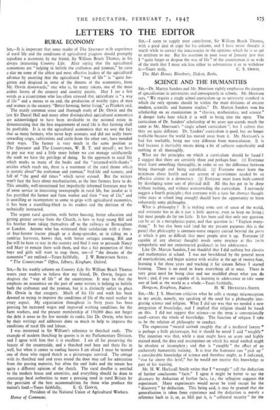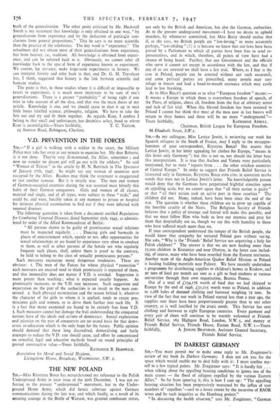Sta,—Mr. J. S. Morrison criticises what he calls a strange
misconception in my article, namely, my speaking of the need for a philosophy inte- grating science and religion. What I did say was that we needed a new integration of knowledge, and I implied that religion should be based on this. I did not suggest that science—as the term is conventionally used—covers the whole of knowledge. The function of religion I take to be the relation of philosophy to conduct.
The expression "mental outlook roughly that of a medieval lawyer " is perhaps a little picturesque, but it should be noted I said "roughly." The intention was that, while a man might have an acute and highly trained mind, the data and assumptions on which his mind worked might be obsolete or incomplete ; and that is " roughly " the effect of an exclusively humanistic training. It is true the humanist can "pick up" a considerable knowledge of science and therefore might, as I indicated, "rise far above this level," but he would not receive this knowledge ag part of his training.
Mr. H. W. Heckstall Smith writes that I " wrongly " call the deduction of further conclusions "facts." I agree it might be better to say the discovery by deduction of further facts, i.e., the syllogism suggests the experiment. Many experiments would never be tried except for the " discovery " by deduction. This being said, it may be granted that the generalisation is taken from experience and the deduction is merely a reference back to it, or, as Mill put it, is "collateral security" for the
truth of the generalisation. The other point criticised by Mr. Heckstall Smith is my statement that knowledge is only obtained in one way, "by generalisation from experience and by the deduction of partici;ar con- clusions from general propositions." This he says is no more scientific than the practice of the scholastics. The key word is "experience." The schoolmen did not obtain most of their generalisations from experience, but from hearsay, i.e., tradition. All knowledge is obtained from experi- ence, and can be referred back to it. Obviously, we cannot refer all knowledge back to the special form of experience known as experiment. We cannot, for instance, make large-scale experiments in history. We can interpret history and refer back to that, and Dr. G. M. Trevelyan has, I think, suggested that history is the link between scientific and humane studies.
The point is that, in those studies where it is difficult or impossible to resort to experiment, it is much more important to be sure of one's generalisations. There is a greater " probability " of being right if one tries to take account of all the data, and that was the main thesis of my article. Knowledge is one, and we should cease to shut it up in neat little boxes labelled science, philosophy, religion. We have to take the bits out and try and fit them together. As regards Kant, I confess I belong to that small and unfortunate, but doubtless select, band to whom Kant is unintelligible.—Yours faithfully, T. U. TAYLOR. /5 Stanton Road, Bebington, Cheshire.



































 Previous page
Previous page